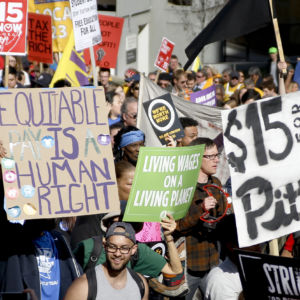The Fight for $15 movement asked supporters Thursday to volunteer a full workweek in the wake of a potential decrease in funding.
The Fight for $15 movement has been an influential political force since it launched in 2012. The past year has posed a potential challenge as its main financial backer reconsidered its own budget. Movement organizers are now asking supports to volunteer a full workweek to help with an upcoming effort.
“[We’re] putting our energy, our resources, and our power to defeating anti-worker politicians all across the country in 2018,” the Fight for $15 said in an email to supporters, which was obtained by InsideSources. “As part of this new fight, we’ll be asking supporters like you to commit to volunteering 40 hours of time – one full work week to help working people – ahead of Election Day 2018. We’re calling it the Forty for $15.”
The Fight for $15 email also announced plans to hold a nationwide protest on Labor Day. The email added that more details will be unveiled for supporters who signed up to help with the protest. The Fight for $15 website included an almost identical post Thursday that omitted the Forty for $15 announcement.
The Fight for $15 calling for volunteers comes amid reports it is facing a funding crisis. The Service Employees International Union (SEIU) has been the primary financial backer of the movement since it started. But the union has reportedly been reverting funds toward election efforts.
Bloomberg reported December 2016 that the union is planning an overall budget reduction of 30 percent. How the movement is being impacted will likely remain unclear until the union submits its next financial disclosure report. The Employment Policies Institute (EPI), a conservative research nonprofit, found in a report August 10 that the movement has organized roughly three hundred fewer protests since last year.
The Fight for $15 and other supporters argue the policy could help lift low-wage workers out of poverty. They warn that the current federal minimum wage of $7.25 an hour is too low for people to reasonably live on. The increase might also spur economic growth as workers gain more purchasing power.
Those opposed to the increase warn it will actually hurt the poor by reducing employment opportunities. Employers could be forced to reduce their staff or increase prices to overcome the added cost of labor. Research has come to various conclusions on whether the risks outweigh the benefits.
Seattle became the first place to pass the $15 minimum wage in June 2014. It was later adopted by dozens of cities across the country. New York and California became the first states to pass the increase. The movement has also worked to increase the federal minimum wage, which hasn’t been updated since 2009.
The email was signed by Antwan Williams who is described as a McDonald’s worker from Detroit, Michigan.

